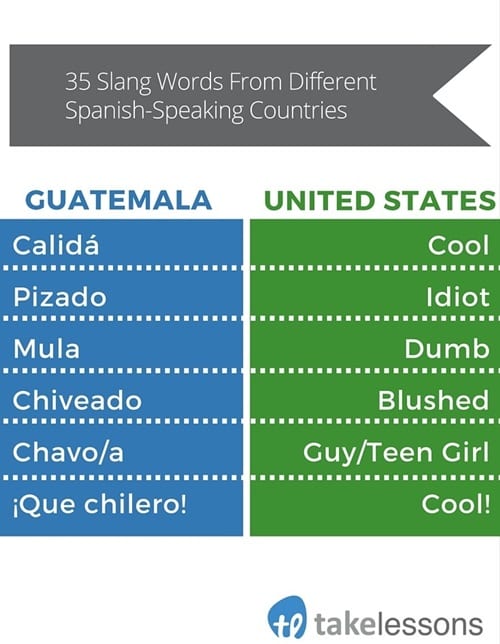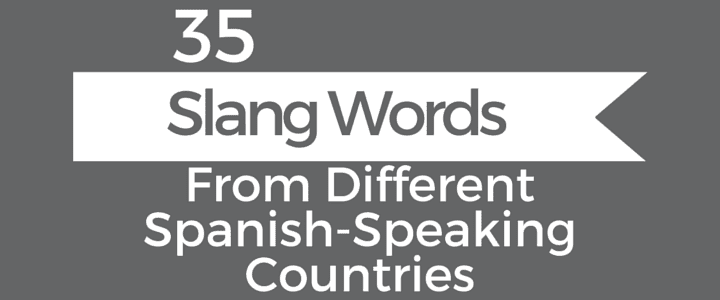Want to add some Spanish slang to your vocabulary? If you’re tired of sticking to your textbook, it might be time to branch out and learn some new phrases. Every country has its own unique usage of slang, and each generation invents new slang words. Here are some examples:
| Mexico | ¡Chale! | Give me a break! |
| Argentina | ¿Qué onda? | What’s up? |
| Colombia | ¡Qué boleta! | What’s up? |
| Guatemala | Deveras? | Really? |
So if you’re learning Spanish “by the book,” you may find it difficult when you try to communicate with native speakers in casual settings. After all, native speakers tend to use more informal words and phrases when in relaxed company. Sometimes, this colloquial Spanish vocabulary is regional, and other times it’s generational.
In these situations, it doesn’t matter how fluent you are in Spanish. If you are unfamiliar with certain Spanish colloquialisms, you may not understand the context of your conversations. We’ll take a closer look at more informal Spanish vocabulary in this article.
Formal Vs. Informal Spanish Vocabulary
Just like you learned your native tongue, native Spanish speakers learned formal Spanish in school and the more conversational aspects of the language outside of the classroom. Maybe they picked up slang on the playground, from their other siblings, or even in pop culture like movies and TV shows. Perhaps they’ve picked up a new way of saying, “What’s up?” or “That’s cool.”
Much like you may hear different slang words in California than you would hear in Texas, the same goes for informal Spanish vocabulary in different regions and countries. To help you pick up some words here and there, we’ve provided a handy guide.
Here, we’ll discuss common colloquial Spanish words from a few different countries so you can start practicing with friends. (You should also practice cognates – words you already know in Spanish – to add even more to your vocabulary)! Playing around with new words is a great way to practice and develop your Spanish speaking skills. And who knows? You may make some new friends along the way.
What Are Some Spanish Slang Words from Around the Globe?
You’ll find Spanish slang words around the globe, as well as common expressions used in different Spanish-speaking cultures. Here, we’ve provided a list of informal Spanish slang to English found in Mexico, Argentina, Colombia, Guatemala.
Mexico
Slang is often used in Mexico when speaking with friends in informal settings. Because Mexico is just across the border from the U.S., you might even hear some Mexican Spanish slang used in the states among native speakers. Here are some of the most common words and phrases you’ll come across, along with a visual reminder below:
- ¡Chale! (Give me a break!)
- ¿Mande? (What did you say?)
- ¡Noombre! (No way!)
- Sale (Alright)
- ¡Qué padre! (That’s tight!)
- ¡Ándale! (Come on!)
- ¡Órale! (All right!)
- ¡Aguas! (Watch out!)
- Sangrón (Stuck up person)
- Fresa (Preppy/snobby/spoiled brat)

To get a feel for using these words and phrases, here is an example conversation where you can see some slang in action:
“¡Mijo!” (My son!)
“¿Mande?” (What?)
“¿Dónde está tu prima?” (Where’s your cousin?)
“¿Cual prima?” (Which cousin?)
“Ay, tú sabes. La fresa.” (Oh, you know. The snob.)
“Pues, no sé. Pensé que estaba trabajando.” (Well, I don’t know. I thought she was working.)
“¡Noombre! Nunca hace nada.” (No way! She’s never doing anything.)
“A poco. Pues, está mal.” (Really? Well, that’s not good.)
Related Article: 20 Spanish Traditions
Argentina
There are just as many Spanish colloquialisms that you can use in Argentina in South America. Understanding how natives refer to words like “taxi” and “city bus” will come in handy, especially when traveling around the country. Here are some words and phrases to know:
- ¿Qué onda? (What’s up?)

Ready to make good use of some of these nouns and phrases? Here is a sample conversation using Argentinian Spanish slang:
“¿Como va?” (How are you?)
“Pues, más o menos, y tu?” (Well, I’m so-so, and you?)
“Un poquito enojado con mi novia.” (A little mad at my girlfriend.)
“Por qué?” ( How come?)
“Porque es una mujer garca.” (Because she’s a dishonest woman.)
“No me digas. Te dije que te das bola.” (You don’t say. I told you to pay attention.)
Colombia
The Colombians know how to use their slang as well! Heading to Colombia? Try any of these phrases out next time you’re having a casual conversation. Begin by asking, “What’s up?” and you’ll be off to a great start.
- ¿Qué más? (What’s up?)
- ¿Qué hubo? (What’s up?)
- ¡Pilas! (Be careful!)
- ¡Qué boleta! (How embarrassing!)
- Camello (Heavy work)
- Mono (Blonde)
- Estar en la olla (To be in a bad situation)
- Storbar (To disturb)
Another example conversation using Colombian Spanish slang:
“¿Qué hubo?” (What’s up?)
“Nada, solo aqui pensando.” (Nothing, just thinking.)
”¿Algo pasó?” (Did something happen?)
“Pues… estaba en la olla en mi trabajo.” ( Well… I was in a bad situation at my job.)
“¿Y?” (And?)
“Alguien me dio el trabajo equivocado y no sabia.” (Someone gave me the wrong job to do and I didn’t know it was wrong.)
“¡Qué boleta!” (How embarrassing!)
See Also: 14 Venezuelan Slang Words
Guatemala
Central America has its fair share of slang, too. Take Guatemala for instance. They have their own slang for words like “cool” and “dumb.” Check out some of the words and phrases that Guatemalans use in everyday conversation. Don’t forget to practice these if you’re traveling to Guatemala soon!
- Calidá (Cool)
- Pizado (Idiot)
- Mula (Dumb)
- Chiveado (Blushed)
- Chavo/a (Guy/Teen girl)
- ¡Que chilero! (Cool!)

Want to see how to use some of these words and phrases in conversation? Here is an example of the above Guatemalan slang in action:
“Conocí a una chava.” (I met a girl.)
“Deveras?” (Really?)
“Sí, era tan bonita, y yo en silencio me puse chiveado.” (Yes, she was so pretty, and I was blushing in silence.)
”Jeje, que chilero.” (Hehe, that’s cool.)
As you can see, slang words are commonly used in Spanish culture.
Use Spanish Slang Words in Your Vocabulary
These Spanish slang words can be extremely helpful to add to your conversations, and can also help you understand what you’re hearing in more casual Spanish language situations.
A Spanish tutor may also be able to give you some lessons on colloquial Spanish phrases to look out for when learning this Romance language. You can sign up for online Spanish lessons to make learning Spanish easier and more convenient than ever. Or, take Spanish group classes to practice conversational Spanish skills. With a few lessons under your belt, you will be all set to impress your Spanish-speaking friends.
 Post Author: Emmanuel N.
Post Author: Emmanuel N.Emmanuel N. teaches online Spanish and singing lessons. He earned his B.A. in psychology from California State University, Fullerton and has been teaching since 2015. Learn more about Emmanuel here!
Suzy S.

